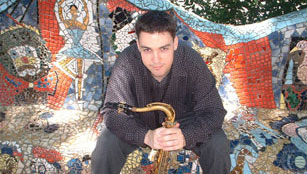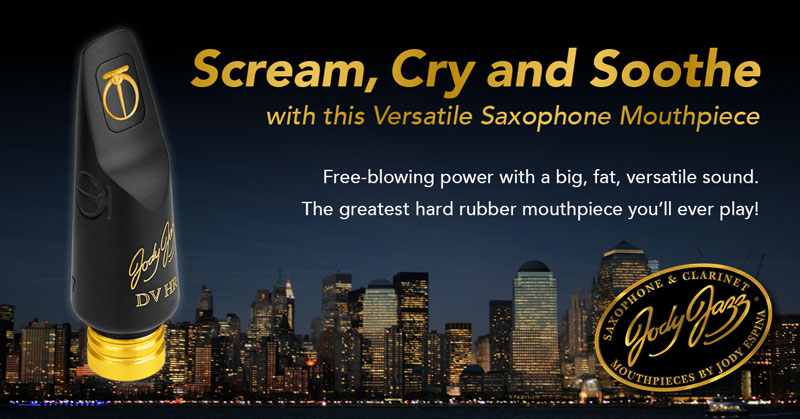Mark Small on Michael Buble, Improving your Improv, and Lots More

New York City’s Mark Small is a badman on the tenor.
Although he’s done much more, Mark’s main claim to fame is as the tenor guy in massively popular modern-day crooning sensation Michael Buble’s touring and recording ensemble. Tours with Buble have taken Mark to each and every corner of the planet as well as TV programs such as Saturday Night Live, Leno, Letterman, Ellen, and many others. Mark was a featured soloist on both saxophone and clarinet for the Grammy award winning DVD “Michael Buble meets Madison Square Garden” as well as a live performance for PBS, (which went on to become a Grammy nominated DVD, entitled “Caught in the Act”).
Outside of the Buble bubble, Mark’s performed with groups such as the Vanguard Orchestra and Darcy James Argue’s Secret Society at such notable clubs as the Blue Note, 55 bar,Village Vanguard, and the Jazz Gallery. He’s also co-leader, along with saxophonist Walter Smith III, of the group “Bronze” which saw the release of their first self-titled recording in 2008. To top it all off, Mark is comfortable playing woodwinds in NYC orchestra pits and has formidable chops in the arena of composing and arranging.
Doron Orenstein: You’ve played some high-profile groups such as Michael Buble’s band as well as the Village Vanguard Orchestra. Did you make focused efforts to get these gigs, or did they just come to you as a result of being in the jazz scene for some time now?
Mark Small: It’s funny that you ask about these two bands because how I got my chance to play with them couldn’t be any more opposite. The Vanguard Band might just be the reason I play music today. I had gone to see them in high school when I was at the MSM summer jazz camp. I played jazz for fun and was into listening to bands like the Tonight Show Band as well as players like Michael Brecker and Branford Marsalis. I remember the VJO was about to play the ballad “skylark” and thinking, ‘oh I know this one’. Then they started to play Brookmeyer’s arrangement which just floored me. I think in a vague way that was the moment I realized that the possibilities for the music were endless and that I really hadn’t even skimmed the surface. I wanted to play with that band so bad from that point on. I was lucky enough to study with Dick Oatts and have John Mosca as my jazz band conductor for a year at UConn. After that I just went down all the time when I moved to NYC and I would practice the few charts I had sax section parts to at home, like “cherry juice”. Playing in that band is still one of my biggest thrills in music to this day.
As for Michael’s band, I had a few friends who were playing in the band when it first started. I remember they asked me if I wanted to come see them at the Blue Note in NYC. I was impressed with his voice during the first set, and equally surprised at how funny and easy he was with the crowd. Then second set, he said everything verbatim and I thought “this guys going to get some bad reviews. He just does the same thing.” I was introduced to him after the show and didn’t think about it until a couple months later when a friend from the band asked me to sub for him because he couldn’t do their Australian tour. I didn’t see myself joining the band but they ended up asking me to join and I couldn’t resist the travel and a chance to hang with my friends who were on the band. At that time, I had no idea he would end up getting so big.
DO: I imagine that you had to memorize a ton of music for the tours with Michael Buble. Can you talk a little bit about the process of learning all of that music?
MS: As for Michael’s music, it’s not the most demanding compared to the things I’m used to playing in NYC (Darcy James Argue’s music for example) and I was pretty versed in Frank Sinatra’s music before playing with MB. We would be able to read it on stage for the tour if we wanted but if there’s one thing I’ve excelled at, it’s memorizing music. It just comes easier than reading for me. I was more of an ear player growing up, so memorizing the sound of inner parts comes a little more naturally. I think the big part is that first time you play it without looking. You’re going to make some mistakes so it’s better just dive right in to playing it without looking earlier on. That’s what I’ve always found (as long as someone allows you to make a mistake or two).
The other thing about playing the music in MB’s band was that you did it everyday, the same way. Anything you do on a consistent day to day basis, you’re going to know it inside and out very quickly. I wished I had had more chance to play another instrument on that tour because the night after night repetition would make it possible to pretty much learn anything.
DO: You clearly have a strong command of the straight ahead and bebop style of playing. What are some of the things you did to solidify those sounds as part of your musical vocabulary?
MS: I would say that my foundation for playing bebop definitely came out of studying with Dave Santoro. Not only did he tell me what were good records to check out for that linear/chord tone style of playing, he also had a real method for getting you to work through the material. It stems from the things that he and Jerry Bergonzi teach which deals with where you start your lines and what direction you want to take them. You methodically practice all the possibilities and then they just comfortably come out when you’re improvising. Before that, if I wanted to play bebop, I was just learning vocabulary and would be at the mercy of a few licks (which didn’t make me a fan of PLAYING bebop when I began). Coupling that method with just listening and playing along with transcribing bebop masters is pretty much where that vocabulary comes from for me.
DO: Moving on to some of your more cutting-edge projects, what is it that you’ve done to be able to expand your musical vocabulary from that of a traditional jazz style to the more modern sounds?
MS: As I said earlier, listening to different things and playing along is really key for expanding. I prefer your use of ‘expanding’ to the idea of ‘modern’ because there’s a strange emphasis in the music scene on being either ‘modern’ or ‘traditional’ which I don’t really agree with. I think it’s more a matter of expanding your palette. I find that a lot of things that are termed ‘modern’ are just borrowed from another source and incorporated in a new way into a field they previously weren’t. ‘Tradition’ is more of an emphasis on studying the finer, more focused points of already existing styles and conventions. You can always get to a deeper essence of a style or you can continually expand your boundaries beyond what elements you are used to. Both are important in their own way and shouldn’t be mutually exclusive.
As for how I try to expand my vocabulary, I find that trying to see what elements I can take from other musical traditions is the best way for me to widen my playing. I took a trip to Bulgaria with my good friend pianist Asen Doykin. He introduced me to the folk music there which has a long tradition while at the same time sounds cutting edge. The rhythms that they’re dealing with and the way in which they feel them are very different from what I was used to (there are definitely players in NYC dealing with this style as well). They play songs in 11/8, yet the way they feel it sounds more like 3/4 with a slight lift on the middle beat. And to see everyday people dance to this like it was second nature is wild. This break from a rigid, metronomic feel is something I’ve also dealt with in latin music as well, were you feel the clave and how it breathes rather than an even pulse. I don’t mean to make it sound technical because when it comes down to it, they just feel the groove differently than other music.
Also, trying different combinations of instruments or changing the traditional role of an instrument is another way to expand the possibilities when it comes to composition and group interaction. Sometimes when I practice, I like to see if I could play the bass players part, or be a drum.
DO: What are you practicing most these days?
MS: What I’m trying to practice these days, besides a mountain of new music I get from composers week to week, is just trying to find simple structures and keep them consistent while moving through difficult sets of changes. Could be as simple as playing thirds going up a scale but keeping it going through a few bars of a tune and starting back from the bottom when I run out of horn at the top. It’s really my attempt at trying to navigate unfettered through a set of changes rather than trying to plug in ideas that might work on this or that chord. If I can keep one structure going through a particular set of changes even when I change the meter, tempo, harmonic rhythm, substitute chords, etc., then I feel like I’m getting somewhere. I find that doing this loosens me up to explore anything I want on some of the hardest sets of chord changes and formal structures. Its like stretching before running. Then when I actually play, I don’t think about those structures and I may not even play them at all.
DO: What non-jazz music has influenced what you play and write?
MS: These days I think I’d be split between singer/songwriters who have striking, memorable melodies as well as classical composers such as Brahms and Chopin. At the same time, I’m always looking for songs with a unique groove or use of the rhythm section/accompaniment like D’Angelo, Egberto Gismonte, Elliott Smith, J Dilla, and Radiohead. I think that sense of production that you find in musicians like these has become way more important in recent years to jazz performers live shows as well. For a time it seemed you could just set up, play 4tet and hit a standard while following the conventions and it would be fine. That definitely still happens (and don’t get me wrong, when good players do it, it sounds exciting) but in NYC you find a lot more players really shaping the sound of their band, not only in the recording studio, but on the bandstand as well.
DO: For those new to your music, which recordings would you recommend they check out?
MS: I don’t have a solo recording as of yet, but some of the projects that I can be heard on are:
- Mark Small/Walter Smith III: Bronze
- Darcy James Argue and Secret Society: Infernal Machines (nominated for a Grammy this year)
- Dymaxion Quartet: Sympathetic Vibrations
- (if you can find it) Mike Fuerstein’s Mainframe is some really interesting music I play alto on.
Mark’s Setup
- Tenor: Balanced action Tenor, Reso Link 7*, Francois Louis reeds size 3
- Alto: Conn Art Deco, ARB (size ?) worked on by John Van Wei, Jazz Select 3 1/2
- Soprano: Selmer Series 3, Selmer C*, Vandoren blue box size 3





